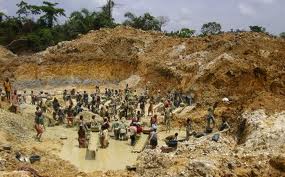Special topics
 Public sector players in the minerals industry are meeting in Accra to find ways of reducing the impact of falling gold prices on the Ghanaian economy.
Public sector players in the minerals industry are meeting in Accra to find ways of reducing the impact of falling gold prices on the Ghanaian economy.
Organised by the Mineral Commission, the workshop is part of a series of brainstorming sessions to ensure that the economic shocks that come with falling gold prices – unemployment and revenue loss – have little impact on the Ghanaian economy. It brought together participants from the Minerals Commission, the Ministry of Trade and Industry, the Ghana Revenue Authority, civil society, and the Bank of Ghana.
After a rather interesting two years of soaring gold prices in 2011 and 2012, the price of the powerful metal has taken a nosedive in 2013, forcing the government to abandon proposed windfall taxes.
From $1,224.53 per ounce in 2010, the prices rose to $1,571 in 2011 and subsequently to $ 1669 per ounce in 2012.
However, in 2013, the price of the precious mineral began its free fall from its historical highest to its lowest in recent years at $ 1192 per ounce in June. Currently, gold is trading between $1300 and $ 1350.
With 2012 Ghana Revenue Authority figures showing a $5.6 billion in export revenues and a total foreign direct investment of more than $12.5 billion from 1983 to 2012, the mineral sector currently contributes 27 per cent of government’s revenue.
Prof. Bruce Banoeng-Yakubo, the Chief Director of the Ministry of Lands and Natural Resources, said that called for measures to ensure that the gap created by the falling prices was filled.
“The recent significant fall in the price of gold, Ghana’s flagship mineral, is a major concern to government, as well as industry players,” he said.
Prof. Banoeng-Yakubo, therefore, commended the Minerals Commission for its preliminary assessment of the anticipated impact of the falling prices which, he said, would be discussed extensively to find an immediate, short and long-term antidotes.
The Chief Executive Officer of the Minerals Commission, Mr Ben Aryee, said a way out was the diversification of the country’s mineral interests to reduce its dependence on gold.
While critics are of the view that the country is not making enough gains from the mining sector because of the lack of value addition to minerals, Mr Aryee said that alone was not enough since “ the more you diversify from depending on one commodity the better prepared you are because the variations would help against price fluctuations.”
“In the short-term, we cannot do too much about it, because when the price goes down; profits go down which affect the dividend paid to government. So government needs to start rethinking its priority areas.”
“In the medium to long-term, there are issues of employment. Government should generate employment, if the price keeps going down and the price of cost remains the same, employment is likely to go down. That creates complications which government would have to face again so those are things we are also going to look at,” he said.
Source: Daily Graphic
Get the latest news and updates on Ghana’s oil and gas value chain by following us Reporting Oil and Gas on twitter @oilgasghana and like our facebook page and get at us on Google+. Subscribe to our group to get updates.